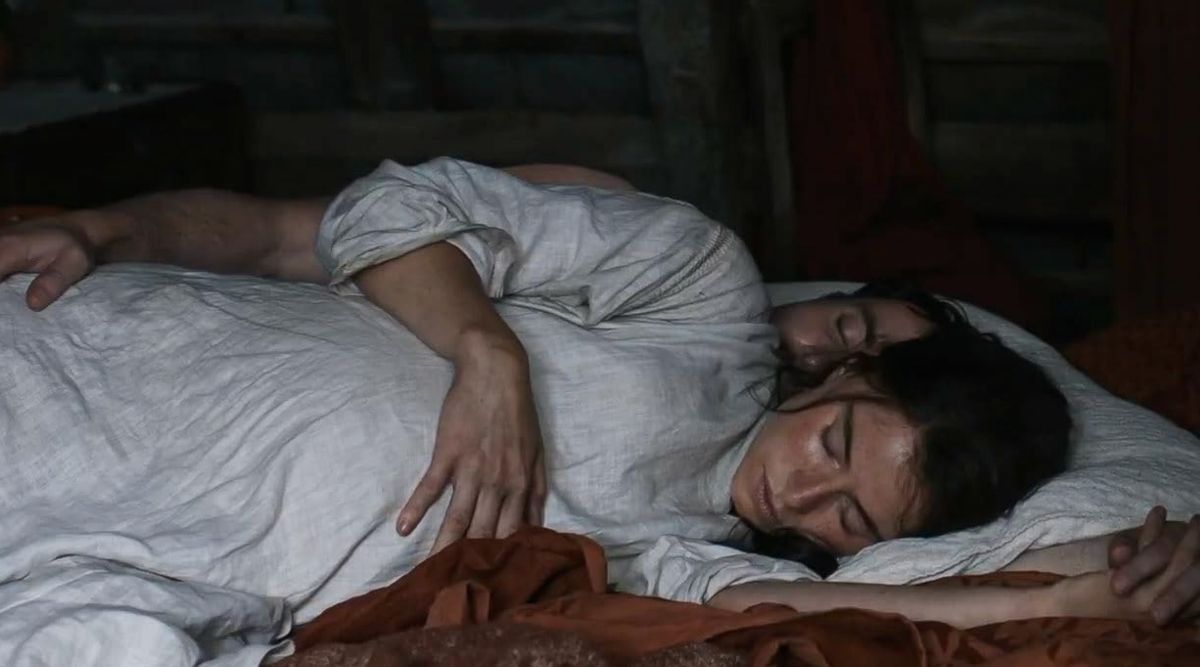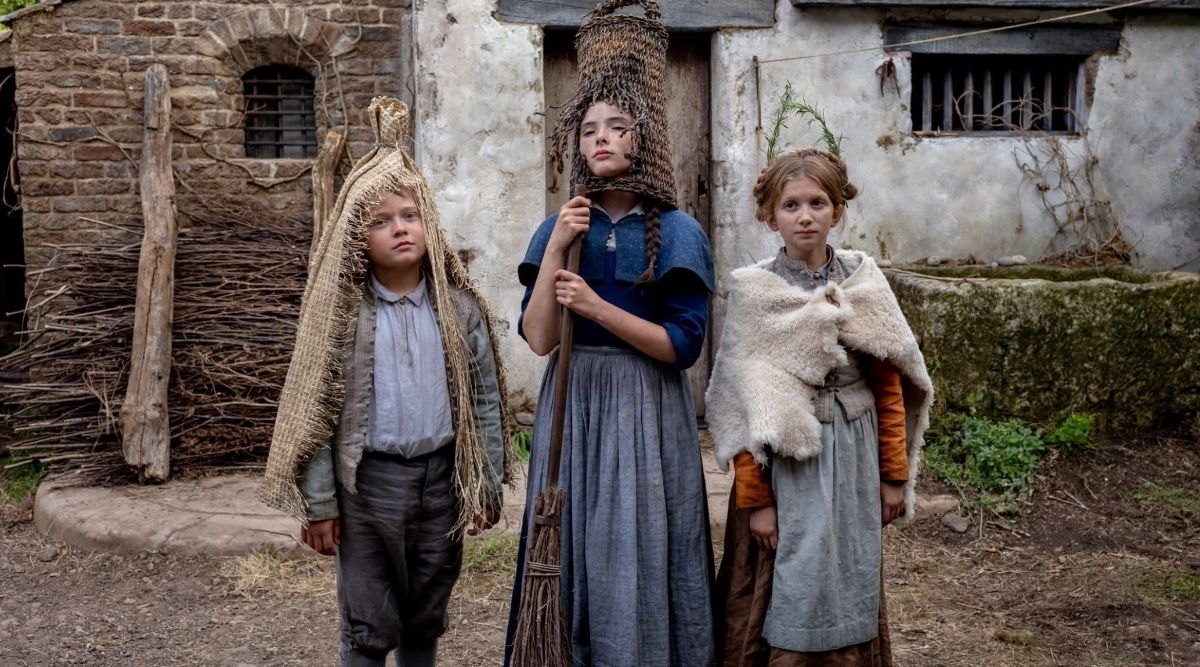Chloé Zhao’s Hamnet (2025), based on the novel by Maggie O’Farrell, is a fictional account of the love between William Shakespeare (Paul Mescal) and his wife, Anne Hathaway, who is changed to the character Agnes (Jessie Buckley). The movie chronicles their meeting and wedding, the births of their children, and the death of their only son, Hamnet (Jacobi Jupe). While it only accounts for a portion of the movie’s runtime, the death of Hamnet ultimately becomes the motivating factor behind the Bard’s greatest tragedy, the play Hamlet.
While there are multiple clear acts in Hamnet, separated by total fades to black and large jumps in time, there are two main distinct sections: before the death of Hamnet and after his death. The former is much longer and somewhat overdrawn than it needs to be. It’s fixated on the forest where Agnes and her brother, Bartholomew (Joe Alwyn), were raised by their true mother and builds an understanding of who each of the players is as they come cascading into one another’s lives.
Understanding Agnes and Will before they lose their son is essential to the payoff of the second act. Agnes is an ethereal being, almost dryad-like in her connection to the earth, the forest, and its creatures. She struggles to connect with people because she assumes that everyone is on the same, heightened emotional wavelength as her and that those emotions are always so clearly conveyed.
The love within the Shakespeare family is incredibly strong.

Will is a genius in his own right, coming to Agnes’s family first as a tutor, paying off his father, a glovemaker’s, debts. He, too, struggles to connect with others because he has been taught to channel all his emotions into the written word.
It’s not that he doesn’t feel; in fact, he feels more deeply than most anybody else besides, perhaps, Agnes. He just needs the space and time to articulate those feelings because they don’t come to his tongue as rapidly as they do for Agnes.
As they fall in love, marry, and have children, the most remarkable aspect of their relationship is the uncontested love they have for one another. Even when Agnes is at her most whimsical or demanding, Will is never a hair short of understanding and supportive.
Will’s love for his children is stronger than most in any other period piece.

When he moves away to London for months at a time to work and support their family, it’s not without vast regret. There is no emotional distancing or affair, like so many other stories would expect from this couple. There is only longing and frustration at their inability to stay together.
When they do have children, however, Will and Agnes alike find themselves as lush with love and care for them as their beloved forest is with trees. Unlike the houses they both grew up in, theirs is full of constant affirmation, physical touch, and care for their well-being.
It’s not only a beautiful juxtaposition to the average period piece filled with rugged and coarse households—it’s a vast departure from most families on film. Especially with the way Will so deeply and clearly shows affection towards his children.
Hamnet perfectly depicts the breakdown of a household after the loss of a child.

The first portion of the movie could easily have been shorter. It grows tedious, even while skipping vast amounts of time between acts. But all of it leads to the inevitable. Agnes prophesies the demise of one of her children, and, as the movie makes clear from the outset and as history has well established, Hamnet is not long for the world. The movie perfectly depicts the breakdown of a household after the loss of a child. And the work of art that Will creates in its aftermath is recontextualized completely.
Hamnet puts on several critical scenes from Hamlet, some shown in rehearsal, others on stage. On their own, they are effective, but in the context of all the life Shakespeare lived up to that moment, they reach a completely different level of impact than any staging before.
None of what makes Hamnet resonate would be possible without stellar performances from its leads. Jessie Buckley, in particular, stands out for her alternating expressions of self-confidence, irrationality, and total emotional breakdown. While Mescal suffers from the same overly quiet performance that regularly plagues him, there are many moments where that stoicism is all-powerful. The true gem of the cast, however, is Jacobi Jupe as Hamnet.
Jacobi Jupe is the best actor in Hament.

The young actor is simply astounding. His love, enthusiasm, fear, and jealousy are all portrayed with equal power. The movie would be far less successful were he not so commendable in every scene. The moments where Hamnet enters a less literal world only work at all because of Jupe’s performance in them and in every other scene before them.
While the forest that Agnes so loves feels a little empty during the longer first portion of the movie, it at least reflects well the unbearable emptiness that she and William must endure after losing their son. It’s also a reminder that so much life exists outside of the emptiness, as the scenes make the forest feel so much larger than any of the sparse indoor locations could ever be.
Hamnet feels empty and drawn out at times, but in that emptiness is an exceptional display of tragedy and grief that helps demystify Shakespeare’s greatest play. The ways that Agnes and Will show their love and their grief are completely distinct, yet vividly recognizable through the Bard’s works and his deep understanding of emotion. It just takes a few tries to fully grasp the depth of its meaning.
Hamnet is in theaters November 26th.
Hamnet
-
Rating - 7/107/10
TL;DR
Hamnet feels empty at times, but in that emptiness is an exceptional display of tragedy and grief that helps demystify Shakespeare’s greatest play.







